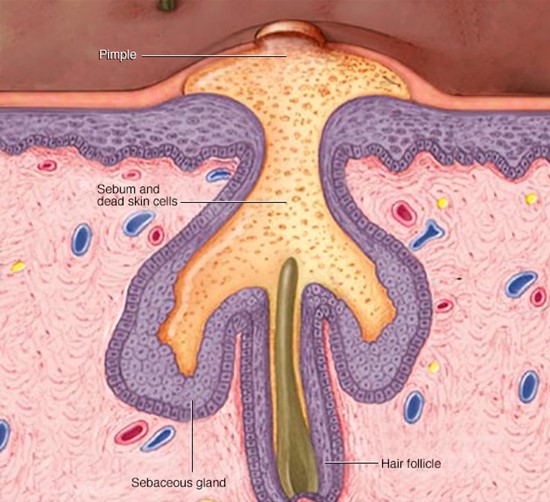
It is well-known that sodium hyaluronate is an extremely effective moisturizing ingredient. Many skincare products include this substance to achieve hydration effects. However, some people might worry that hyaluronic acid could cause acne. Let’s explore this concern by examining the causes of acne, the moisturizing mechanism of hyaluronic acid, and reviewing some scientific studies and cases.
How Does Acne Form?
Acne is a condition characterized by skin rashes, including whiteheads, blackheads, pustules, papules, and cysts. The four main factors that cause acne are:
- Excessive oil production
- Blockage of hair follicles by oil and dead skin cells
- Bacteria
- Inflammation

Fig 1. How acne develops[1]
Fig 1 shows the process of acne formation. When oil and dead skin cells clog hair follicles, acne appears. Bacteria can trigger inflammation and infection, leading to more severe acne.
Key Questions About Hyaluronic Acid and Acne
To understand whether hyaluronic acid can cause acne, we need to address two questions:
- Does hyaluronic acid clog hair follicles?
- Does hyaluronic acid cause inflammation?
Answering these questions will help us determine the ultimate question: Does hyaluronic acid cause acne?
Does Hyaluronic Acid Clog Hair Follicles?
The answer is: No
Existing studies and the literature on whether hyaluronic acid blocks hair follicles tend to agree that it’s not funny. This means that no arteries or tumors are blocked. According to a study published in the Journal of Clinical and Aesthetic Dermatology, hyaluronic acid is a non-comedogenic ingredient, suitable for all skin types, including oily and often acne-prone skin.
Hyaluronic acid occurs naturally in human skin and connective tissue. It has excellent moisturizing and lubricating properties.
The hydrating effect of hyaluronic acid is evident in the following aspects.
- Water soluble properties: Hyaluronic acid can be absorbed one thousand times its weight in water. This helps to form a moisturizing barrier, preventing moisture loss and keeping skin glowing and firm.
- Intercellular matrix increases hydration: Hyaluronic acid not only acts on the surface of the skin but penetrates deeper layers, increasing the porosity between cells. This helps improve cellular environment, metabolism, and regeneration, thus enhancing skin health and radiance.
- Control of extracellular morphology: Hyaluronic acid is an important component of the extracellular matrix. It works with collagen, elastin, and other matrix components to maintain skin structure and function. By bonding with water, hyaluronic acid provides the skin with essential lubrication and firmness, reducing dryness and fine lines.
- To regulate the barrier function of the skin: Hyaluronic acid can increase the barrier function of the skin, thereby preventing the formation of harmful external factors and reducing water loss. A healthy skin barrier helps maintain moisture balance and prevent dryness and dryness.
Does Hyaluronic Acid Cause Inflammation and Worsen Acne?
The answer is: No
Research shows that hyaluronic acid can not only moisturize the skin but also reduce inflammation.
Hyaluronic acid has great anti-inflammatory properties and is widely used in skincare and medical applications. It has anti-inflammatory mechanisms:
- Inhibit the production of inflammatory substances: Hyaluronic acid inhibits inflammatory signaling pathways, reduces the production of inflammatory substances, and reduces skin inflammation. For example, it can inhibit the production of cytokines such as IL-1 and TNF-α, reducing inflammatory cell infiltration and activation.
- Reducing oxidative stress: Hyaluronic acid has antioxidant properties, neutralizing free radicals and reducing oxidative stress in skin cells. This helps reduce inflammation caused by oxidative stress and protects the barrier function of the skin.
- Promotes tissue repair and healing: Hyaluronic acid plays an important role in wound healing. It stimulates cell migration and proliferation, accelerates wound closure, and reduces scarring. This process helps to quickly control inflammation and promote normal skin function.
- Enhances the barrier function of the skin: Hyaluronic acid can strengthen the barrier of the skin, and prevent the invasion of irritating microorganisms from the outside, thereby reducing inflammation. By maintaining the moisture and barrier of the skin, hyaluronic acid helps prevent and prevent inflammatory skin diseases.
Conclusion
In summary, hyaluronic acid typically does not cause infections or worsen acne. Its non-comedogenic and anti-inflammatory properties make it an ideal ingredient in many skincare products and acne treatment formulations. If you are interested in medical-grade and cosmetic-grade sodium hyaluronate, or if you have any concerns, feel free to visit our homepage for inquiries.
Stanford Chemicals Company (SCC), a famous hyaluronic acid supplier, provides medical grade and cosmetic grade sodium hyaluronate. If you are interested in these products or have any questions, please visit our homepage for inquiries.
Other Popular Questions About Acne
Question 1: Should You Wash Your Face More Often if You Have Acne?
Many people struggling with acne have oily skin and wonder if they should wash their face more often or use soap to remove excess oil. The answer is no; Don’t wash your face too much. The correct way is to wash your face with warm water twice a day, once in the morning and once in the evening.
You can use a gentle cleanser like benzoyl peroxide, salicylic acid, or triclosan. It’s important to avoid over-washing, which can irritate the skin and aggravate the acne. Over-washing the skin can strip the skin of its natural oils, leading to more sebum production, which can lead to more breakouts.
Q2: Can you wear makeup if you have acne?
This is a common concern for beauty enthusiasts, as many people feel uncomfortable going out topless. The good news is that even if you have acne, you can use some skin care products. The effects of ingredients such as:
- Niacinamide and Zinc Acetate: They help control oil production.
- Ethyl Lactate, Sphinganine, Niacinamide, or Resveratrol: They have anti-inflammatory and antibacterial properties.
- Retinoic Acid, Glycolic Acid, and Lactic Acid: They help dissolve comedones (clogged pores) and improve medication absorption.
Choosing skincare products with these ingredients can enhance acne treatment. However, it’s best to minimize the use of makeup products like BB creams, foundation, or powder, as they can clog pores and worsen acne.
Question 3: What Foods Should You Avoid If You Have Acne?
Regarding the relationship between acne and diet, studies have found that high-sugar and high-fat foods can exacerbate acne. Dairy products, including milk, might also influence acne. Therefore, individuals prone to acne should limit their intake of sugary and fatty foods, as well as dairy products. Additionally, it is advisable to avoid excessive sun exposure, late nights, and constipation, which can also contribute to acne.
For further detailed information on managing acne and skincare tips, you can refer to these sources:
· Journal of Clinical and Aesthetic Dermatology
· American Academy of Dermatology Association
These references provide comprehensive insights into acne management and treatment options.
[1] Fig 1. How acne develops. Source: https://www.mayoclinic.org/diseases-conditions/acne/symptoms-causes/syc-20368047
